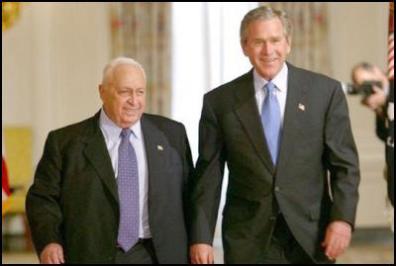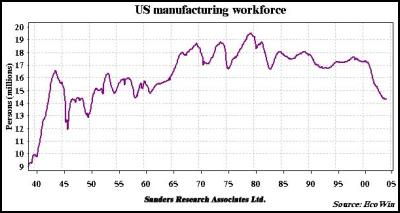SRA Commentary: Brutality in Defence of Cupidity
Sanders Research Associates Ltd. provides international strategic planning and risk management services to both corporate and private clients. SRA also publishes a webzine available by subscription. Visit http://www.sandersresearch.com to get a good feel for the real deal.
COMMENTARY
Brutality in Defence of Cupidity

By Chris
Sanders
April 26, 2004
© 2003-5. Sanders Research Associates. All rights reserved.

If leaders indulge their own desires, then officials and functionaries all extend their desires. If officials and functionaries all extend their desires, then everyone is affected: the poor are drained of their labour, the rich are drained of their wealth, and society loses its order; all people fail to obtain what they want.
- Thomas Cleary, transl. (1993) Thunder in the Sky: On the Acquisition and Exercise of Power, London, Shambhala, ISBN 0-87773-951-X, pp. 114-15
The meeting between President Bush and Ariel Sharon two weeks ago in Washington is an important watershed in the 2004 election. With it, the Bush campaign signalled that it is circling the wagons and is going to appeal to its core constituencies. This is a calculated gamble, as it basically means conceding the rest of the electorate to the Democrats. Since Bush’s core constituency numbers no more than about 40% of the electorate, his campaign strategists are clearly hoping that Ralph Nader can pull enough votes from Kerry to make it possible to win with the assistance of some judicious ballot rigging along the lines so successfully followed in 2000.
Sharon too is gambling big by tearing the mask off the US-Israeli relationship and laying it bare for the world to see. Over the decades since 1967, successive Israeli governments have been at pains to keep their profile more modest. This has not always been easy to do, but it has been smart. It is one of the things which has made the US electorate acquiesce with scarcely a murmur to the vast expense of the close military and intelligence relationship between the two countries.
Sharon however has political problems at home, where he is being investigated on charges of corruption. His own political base is similar to Bush’s in the sense that he is highly dependent on extremists to maintain a working majority in the Knesset. The settlers on the strategically important West Bank who hold de facto veto power over Israeli policy are dominated by fundamentalists such as the Gush Emunim and are increasingly numerous in the officer corps of the Israeli Defence Force.[1]
He may well see an advantage in flaunting Israeli power in the US to outflank his numerous enemies in Israel.[2] ] But this is a risky course, fraught with peril. Sharon is not the first leader to confuse the welfare of the society he lives in with his own; it is indeed a trait he shares with the American president. But for all of the legendary power of the vaunted Jewish lobby in the United States, Jews only number some 5.8 million or about 2% of the population. They are well represented, to be sure, in politics, the press, science, the arts and finance. But effective politics demands the lightest touch, and Sharon’s touch is anything but. Bush’s embrace of Sharon will cost him Jewish votes, not win them.

The list of potential flash points for the special relationship is getting longer and longer. The sound of Israeli bulldozers punctuated by missile strikes in the occupied territories drones in the background, providing the accompaniment to the louder and more spectacular use of force by the Americans in Iraq. Now the US is bogged down in its own version of the West Bank and Gaza. Appropriately for the world’s “indispensable nation” it is that much bigger. American troops are being trained for their operations in Iraq by Israeli “experts.”[3] Then there is the Pollard espionage case,[4] the resurrection of the Liberty incident,[5] and with the most political TNT of all, the Israeli art student affair.[6] This higher Israeli profile only increases the chances of a reaction.
Many Zionists understand the danger, which presumably explains the current fashion for conflating anti-Semitism with criticism of the Israeli state. It is difficult to square anti-Semitism in the West with the manifest success that Jews have enjoyed in Western society, especially in the US and Britain, but the ability to wield the anti-Semitic stigma has been a most effective political weapon. The very term anti-Semitic has become problematic when the putative “enemy” are mostly Arab, i.e. Semite, “extremists.” This has given rise to the notion of Judeophobia, whereby critics of the Jewish state are not fairly applying international norms to Israel’s conduct, but are instead demanding a standard of behaviour impossible to live up to given its size and precarious existence. The truth is that if Israel were held to the standards applied to other states, presumably Ariel Sharon would be in the same prison currently occupied by Slobodan Milosevic in The Hague.
It is all the more remarkable therefore that the Democrats have not only been at such pains to endorse the Bush administration’s foreign adventures and repressive “Patriot” legislation, but to suggest that they could carry them out more effectively. This makes the task of differentiating the Democratic candidate more difficult. Kerry has so far suggested that the Bush tax cuts should be rolled back with a 2% increase in taxes on the wealthy, but in virtually the same breath gives it back with proposed tax cuts for the corporations owned by those same wealthy people. It is symbolic that he has named Roger Altman as his chief economic adviser. Altman, a close friend of Bill and Hilary Clinton, served as Deputy Treasury Secretary alongside Robert Rubin in the first Clinton administration. Altman has variously run Lehman Brothers, served as Vice Chairman of the Blackstone Group and more recently advised CBS on its merger with Viacom.[7] Earlier this year his investment banking firm Evercore bought American media, which owns three of the biggest tabloids in the US, including the National Enquirer and covers 20% of the newspaper reading public. [8]
All these: money, influence and media, too, plus the passage of time, presumably explain why Kerry would select Altman who was forced to resign his Treasury position in 1993 because of his involvement in the Whitewater affair. A more clear demonstration of where real power in the modern Democratic Party lies could scarcely be imagined. The Democratic Party is the Democratic Leadership Council and make no mistake about it.
This matters. In a recent article published in the American Prospect,[9] President Clinton’s first Secretary of Labor Robert Reich imagines what a second Bush administration would look like. Unconstrained by the possibility of winning a third term, Bush and the neocons would let it rip. We don’t disagree, but are having trouble imagining how a first Kerry administration would behave by contrast.
The Kerry economic plan, to the extent that we can make it out, is predicated on the presumption that the Federal deficit has to be brought under control. This is sensible, but it is not going to happen with a war in Iraq that is spinning out of control. He proposes replacing the United States in Iraq with a UN mission, and replacing US troops with UN troops. Good idea, if predictable, but will it fly? The problems that KFOR face in Kosovo seem intractable enough. Does anyone seriously imagine that the UN could administer Iraq? We can imagine why this looks good to Kerry. Not only does he solve “the Iraq problem” but he gets other people to pay for it as well.
He will need that help because he is trying to buy popular votes with spending promises that don’t add up. Robert Rubin worked the magic for Clinton eight years ago by allowing the GSEs to inflate their balance sheets aggressively and getting the Japanese to devalue the yen. The former more than offset the fiscal contraction in Federal spending by inflating the housing market. The latter made sure that there was plenty of credit with which to do this without driving interest rates through the roof. Both the dollar and financial assets soared as a result. The Federal tax take soared with the markets. The residual was a huge jump in the US current account deficit.
Times have changed. In 1995 and 1996 when Japan intervened to begin driving the dollar up and the yen down, America’s net foreign debt was some 5% of GDP. Today it is 32% of GDP and climbing fast. The $3.5 trillion pile of IOUs issued to foreigners amounts to more than $21,000 per worker, compared to worker’s average annual earnings of just over $27,000. Coincidentally, when Rubin and the Japanese went to work on the dollar and the GSEs, average annual earnings were also $21,000. They have increased 29% since then, while America’s net foreign debt has grown well over 6 fold.
It is worthwhile making this comparison since it is ultimately the taxing power of the Federal government that stands behind those obligations. Behind that stands the power of the economy to create value. That power, which is often mistakenly and disingenuously ascribed to “innovation,” is really based on the ability to actually make useful things which can then make even more useful things. Since 1980, the United States has pursued policies that have, in fact, driven such activity out of the United States, rather than adopting policy that might have attracted it.

Click for big version
US manufacturing employment is lower than it has been in 55 years, having, with no exaggeration, simply collapsed. While most of this collapse has occurred on the watch of Bush & Co., it has been a long time coming. The two business cycles since 1979 both created fewer manufacturing jobs than the one before. This matters, because it is the business of making things that creates more jobs making things, and it is the things that the economy makes that enable it to earn the profits with which to pay for goods and credit from the rest of the world.
The spectacle of American envoys imploring, cajoling and threatening their Chinese counterparts in the hope that China will pass and enforce copyright protection for American music and software forcefully underlines the point. Americans have arrogated to themselves the role of global “innovator” as if the rest of the world is incapable of thinking for itself. The intellectual underpinnings for this lunacy are a self-interested ideological commitment to free trade and open capital markets justified by a superstitious belief in the suitably mutable concept of comparative advantage. The risible consequence is America telling the rest of the world in so many words that it is smarter than they are. This, as anyone who watched Bush and Sharon’s performance two weeks ago or has read about the behaviour of the American Marine Corps in Fallujah knows, is demonstrably false.
It is hard to see how even with the best of intentions a Kerry presidency will deal with these problems because not only are they structural, but he is reliant on the same money and the same men who created them in the first place. These are men adept at gaming the system, not men with a sense of “the vision thing.” They are committed to globalisation because they need it. They have destroyed the productive base of the American economy. They need the rest of the world to survive.
Under the circumstances, “gaming” the rest of the world means that it has to be intimidated.
- Chris Sanders
csanders@sandersresearch.com
[1] The legendary socialist and European character of the Israeli enterprise is a thing of the past. With the passing of the early generation of leaders who were by and large born outside of Palestine, a different sort of leadership has arisen: less well-educated, Israeli born, and more parochial in outlook and world view. This matters in a country whose security depends so much on numbers. Israel has depended heavily on immigration to infuse new blood into the system, but this has created problems of its own.
See Israel Shahak and Norton Mezvinsky (1999) Jewish Fundamentalism in Israel, London, Pluto Press ISBN 0-7453-1281-0, esp. pp. 90-5; Israel Shahak, (1997) Open Secrets: Israeli Nuclear and Foreign Policies, London Pluto Press ISBN 0-7453-1151-2, pp. 37-9; and Martin Van Creveld (1998) The Sword and the Olive: A Critical History of the Israeli Defense Force New York, Public Affairs, ISBN 1-58648-155-X, pp. 315-18.
[2] This is not in the least far-fetched. He castigated Shimon Peres in a cabinet meeting in 2001 for worrying too much about American opinion:
“…every time we do something you tell me the Americans will do this and do that. I want to tell you something very clear, don’t worry about American pressure on Israel, we the Jewish people control America and the Americans know it.” See http://www.wrmea.com/html/newsitem_s.htm
[3] See Seymour Hersh, Moving Targets, The New Yorker Magazine, 15 December 2003.
[4] See Robert I. Friedman, The Secret Agent, The New York Review of Books, 26 October 1989.
[5] The IDF attacked an American surveillance ship operated by the NSA in the eastern Mediterranean in 1967. For the story, as told by the Liberty’s survivors, see USS LIBERTY Memorial.
[6] For sources on Israeili espionage in the US and the 911 connection, see: The Israeli Art Student Files at www.antiwar.com.
[7] Viacom and CBS between them reach 41% of the American public. Under current law, they will be forced to divest themselves of a considerable number of stations. Viacom would also presumably have to scale back its 50% ownership of UPN. Fro more background on the CBS – Viacom transaction, see also Linda Minor, Campaign 2004 – Can we handle the truth? Part 1, www.sandersresearch.com. 23 April, 2004, Quarterly Articles, Level 2.
[8] Evercore’s specialty is media. It has acted for Dow Jones, NBC, Court TV, Telecommunications, and Time Warner. See http://www.nytimes.com/library/financial/091399altman-profile.html
[9] Robert Reich, The Last Word, American Prospect, 1 April, 2004.
© 2003-5. Sanders Research Associates. All rights reserved.


 Binoy Kampmark: Commemorating Mummy - Reflections On Mother’s Day
Binoy Kampmark: Commemorating Mummy - Reflections On Mother’s Day Gordon Campbell: On The New Pope, And The Israeli Attack On Peter Davis
Gordon Campbell: On The New Pope, And The Israeli Attack On Peter Davis Martin LeFevre - Meditations: For The Love Of Sycamores
Martin LeFevre - Meditations: For The Love Of Sycamores Ian Powell: A Timely Call For A Social Contract In Health
Ian Powell: A Timely Call For A Social Contract In Health Binoy Kampmark: Bratty Royal - Prince Harry And Bespoke Security Protection
Binoy Kampmark: Bratty Royal - Prince Harry And Bespoke Security Protection Keith Rankin: Make Deficits Great Again - Maintaining A Pragmatic Balance
Keith Rankin: Make Deficits Great Again - Maintaining A Pragmatic Balance